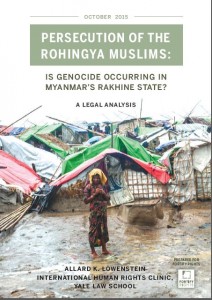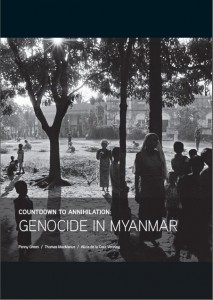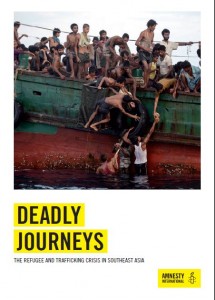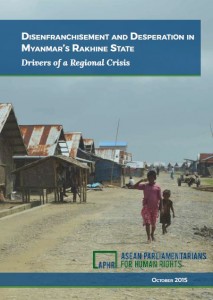Posts Tagged ‘Human Trafficking’ (68 found)
Southeast Asia: Refugee Crisis and Freedom of Expression Must be Tackled at ASEAN Summit
Southeast Asian leaders meeting this week in Malaysia must urgently prioritize a coordinated plan to help the thousands of asylum seekers and migrants from Myanmar and Bangladesh who are forced to risk abuse and death at sea, said Amnesty International […]
• • •PERSECUTION OF THE ROHINGYA MUSLIMS: Is Genocide Occurring in Myanmar’s Rakhine State?
 This legal analysis considers whether the ongoing attacks on and persecution of the Rohingya Muslim population in Myanmar constitute genocide, as defined by the 1948 Convention on the Prevention and Punishment of the Crime of Genocide (the Genocide Convention) […]
This legal analysis considers whether the ongoing attacks on and persecution of the Rohingya Muslim population in Myanmar constitute genocide, as defined by the 1948 Convention on the Prevention and Punishment of the Crime of Genocide (the Genocide Convention) […]
Human Rights Must be at the Heart of Historic Election Period in Myanmar – UN expert
NEW YORK/GENEVA (29 October 2015) – UN Special Rapporteur on human rights in Myanmar, Yanghee Lee, called on all those in positions of authority in Myanmar to ensure that respect for the human rights of all must be at the core of the historic elections due to take place in 10 days’ time […]
• • •COUNTDOWN TO ANNIHILATION: GENOCIDE IN MYANMAR
 The Rohingya face the final stages of genocide. Decades of persecution have taken on a new and intensified form since mass killings in 2012. The marked escalation in State-sponsored stigmatisation, discrimination, violence and segregation, and the systematic weakening of the community, make precarious the very existence of the Rohingya […]
The Rohingya face the final stages of genocide. Decades of persecution have taken on a new and intensified form since mass killings in 2012. The marked escalation in State-sponsored stigmatisation, discrimination, violence and segregation, and the systematic weakening of the community, make precarious the very existence of the Rohingya […]
Burma’s Challenge: Democracy, Human Rights, Peace, and the Plight of the Rohingya
Chairman Salmon, Ranking Member Sherman, and distinguished Members of the Subcommittee, thank you for the opportunity to appear before you today to testify on the important issues of democracy, the protection of human rights, and forging sustainable peace in Burma […]
• • •Southeast Asia: Persecuted Rohingya Refugees from Myanmar Suffer Horrific Abuses at Sea
Rohingya women, men and children attempting to flee persecution in Myammar by boat earlier this year were killed or severely beaten by human traffickers if their families failed to pay ransoms, and kept in hellish, inhuman conditions, Amnesty International reveals in a new report today […]
• • •Southeast Asia: Deadly Journeys – The Refugee and Trafficking Crisis in Southeast Asia
 In May 2015 three boats carrying 1,800 women, men and children landed in Aceh, Indonesia. Most of the passengers were Muslim Rohingya, a persecuted religious and ethnic minority from Myanmar […]
In May 2015 three boats carrying 1,800 women, men and children landed in Aceh, Indonesia. Most of the passengers were Muslim Rohingya, a persecuted religious and ethnic minority from Myanmar […]
ASEAN parliamentarians warn of looming regional crisis resulting from systematic discrimination in Myanmar’s Rakhine State
BANGKOK, 16 October 2015 – Increasingly marginalized and desperate, Rohingya Muslims in Myanmar’s Rakhine State are being forced to flee in ever-greater numbers, exacerbating a regional crisis that ASEAN leaders are woefully ill prepared to cope with, ASEAN Parliamentarians for Human Rights (APHR) warned today […]
• • •Disenfranchisement and Desperation in Myanmar’s Rakhine State: Drivers of a Regional Crisis
 Political exclusion is exacerbating the already intense sense of desperation among Rohingya Muslims in Myanmar’s Rakhine State, and driving a regional crisis that ASEAN leaders are ill prepared to confront. Unless serious steps are taken to address the situation of deprivation and despair in Rakhine State, many Rohingya will have no other option but to flee in search of asylum elsewhere […]
Political exclusion is exacerbating the already intense sense of desperation among Rohingya Muslims in Myanmar’s Rakhine State, and driving a regional crisis that ASEAN leaders are ill prepared to confront. Unless serious steps are taken to address the situation of deprivation and despair in Rakhine State, many Rohingya will have no other option but to flee in search of asylum elsewhere […]
Burma: International Religious Freedom Report for 2014
Muslim, Christian, and other religious minorities faced physical abuse, arbitrary arrest and detention, restrictions on religious practice and travel, and discrimination in employment and access to citizenship […]
• • •








 All posts
All posts